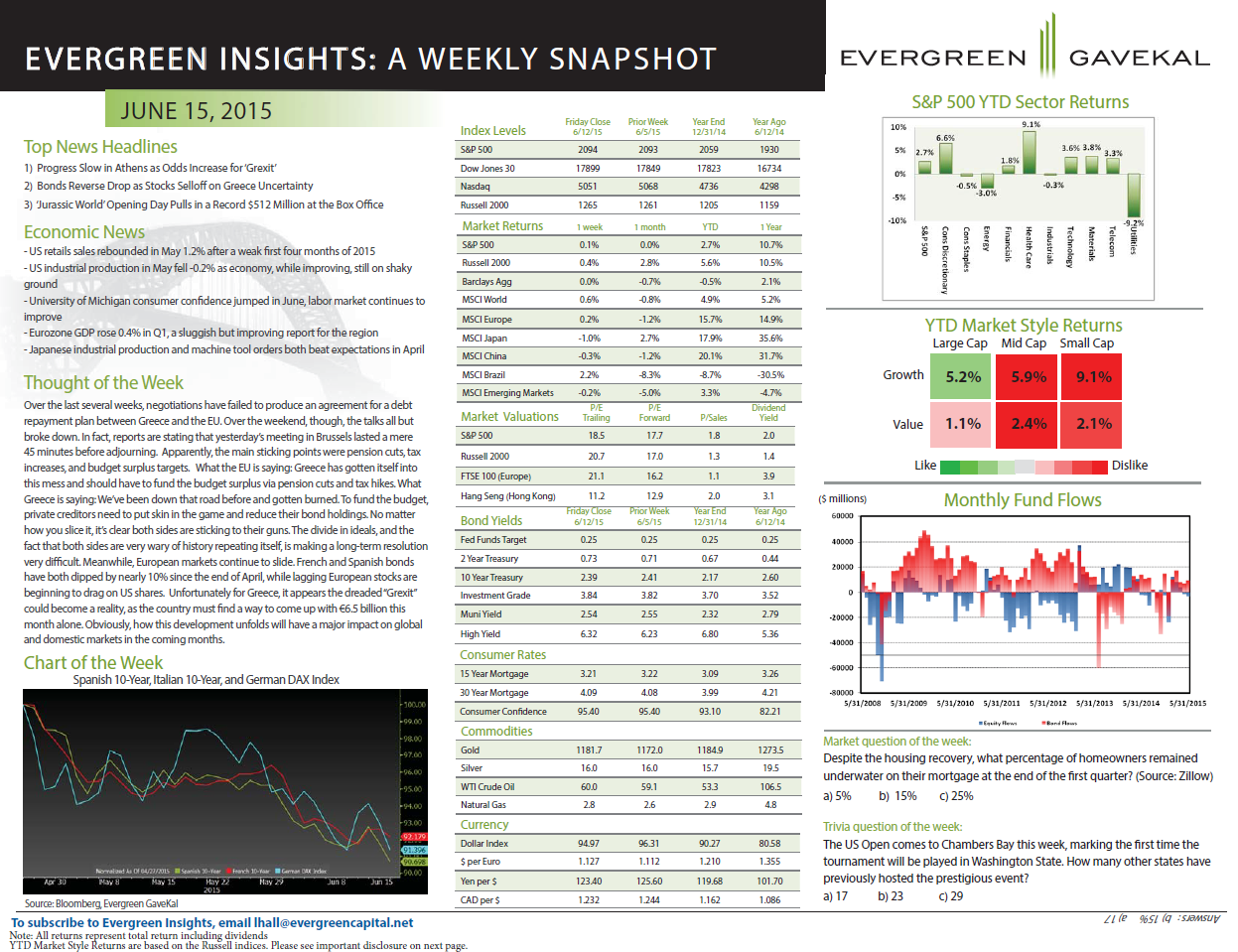 To subscribe to Insights, email jliu@evergreengavekal.com;
To subscribe to Insights, email jliu@evergreengavekal.com;
Note: all returns represent total return including dividends; YTD Market Style Returns are based on the Russell indices. Please see important disclosure below:
DISCLOSURES: This material has been prepared or is distributed solely for informational purposes only and is not a solicitation or an offer to buy any security or instrument or to participate in any trading strategy. Investors must make their own investment decisions based on their financial situations and investment objectives. All of the assumptions included in this presentation are based upon current market conditions as of the date of this presentation and are subject to change. Information contained in this report has been obtained from Bloomberg and Investment Company Institute (ICI) believed to be reliable, Evergreen Capital Management LLC makes no representation as to its accuracy or completeness, except with respect to the Disclosure Section of this material. Any opinions expressed herein reflect our judgment as of the date of the materials and are subject to change without notice. Past performance is no guarantee of future results. All investments involve risk including the loss of principal.
Benchmark indices are provided in this material for comparison with well‐known and widely recognized indices from various market capitalizations, asset classes, markets around the world, and economic data. You cannot invest directly in an index. Index results assume the re‐investment of all dividends and capital gains.
The S&P 500 is a market‐capitalization weighted index that includes the 500 most widely held companies chosen with respect to market size, liquidity, and industry. The Dow Jones Industrial Average is a price‐weighted average of 30 significant stocks traded on the New York Stock Exchange and the NASDAQ. The National Association of Securities Dealers Automated Quotation (NASDAQ) System is a nationwide computerized quotation system for over 5,500 over‐the‐counter stocks. The index is compiled of more than 4,800 stocks that are traded via this system. The FTSE 100 Index is an index of the 100 largest companies (by market capitalization) in the United Kingdom. A market capitalization‐weighted index of 40 of the largest companies that trade on the Hong Kong Exchange. The Hang Seng Index is maintained by a subsidiary of Hang Seng Bank, and has been published since 1969. The index aims to capture the leadership of the Hong Kong exchange, and covers approximately 65% of its total market capitalization. The Hang Seng members are also classified into one of four sub‐indexes based on the main lines of business including commerce and industry, finance, utilities and properties.
The Russell 1000 Index measures the performance of the large‐cap segment of the U.S. equity universe. It is a subset of the Russell 3000 Index and includes approximately 1000 of the largest securities based on a combination of their market cap and current index membership. The Russell 1000 represents approximately 92% of the U.S. market. The Russell 1000 Growth Index measures the performance of those Russell 1000 companies with higher price‐to‐book ratios and higher forecasted growth values. The Russell 1000 Value Index contains those Russell 1000 companies that have higher book‐to‐price ratios, and thus a less‐than‐average growth orientation, than the remaining companies in the Russell 1000 Index that encompass the Russell 1000 Growth Index. The Russell Midcap Index measures the performance of the 800 smallest companies in the Russell 1000 Index. The Russell Midcap Value Index measures the performance of those Russell Midcap companies with lower price‐to‐book ratios and lower forecasted growth rates. The Russell Midcap Growth Index measures the performance of those Russell Midcap companies with higher price‐to‐book ratios and higher forecasted growth values. The Russell 2000 Index is an unmanaged index that measures the performance of the 2,000 smallest companies in the Russell 3000 Index. The Russell 2000 Growth Index measures the performance of those Russell 2000 companies with higher price‐to‐book ratios and higher forecasted growth values. The Russell 2000 Value Index measures the performance of those Russell 2000 companies with lower price‐to‐book ratios and lower forecasted growth values. The Russell 2000 Value Index is constructed to provide a comprehensive and unbiased barometer of the small‐cap value market. Based on ongoing empirical research of investment manager behavior, the methodology used to determine value probability approximates the aggregate small‐cap value manager's opportunity set. The Russell 3000 Index is a market capitalization weighted index that measures the performance of the 3,000 largest U.S. companies representing approximately 98% of the investable U.S. equity market.
The Morgan Stanley Capital International (MSCI) World Index is a market capitalization weighted index composed of companies representative of the market structure of 23 Developed Market countries in North America, Europe and the Asia/Pacific Region. The MSCI Europe Index is a free float‐adjusted market capitalization weighted index that is designed to measure the equity market performance of the developed markets in Europe. The MSCI Europe Index consists of the following 16 developed market country indices: Austria, Belgium, Denmark, Finland, France, Germany, Greece, Ireland, Italy, the Netherlands, Norway, Portugal, Spain, Sweden, Switzerland, and the United Kingdom. The MSCI China Index covers the large and mid cap segments in the China and is constructed according to the MSCI Global Investable Market Indices Methodology. The MSCI China Index is part of the MSCI Emerging Markets Index. The MSCI Brazil Index is designed to measure the performance of the large and mid cap segments of the Brazilian market with 81 constituents.